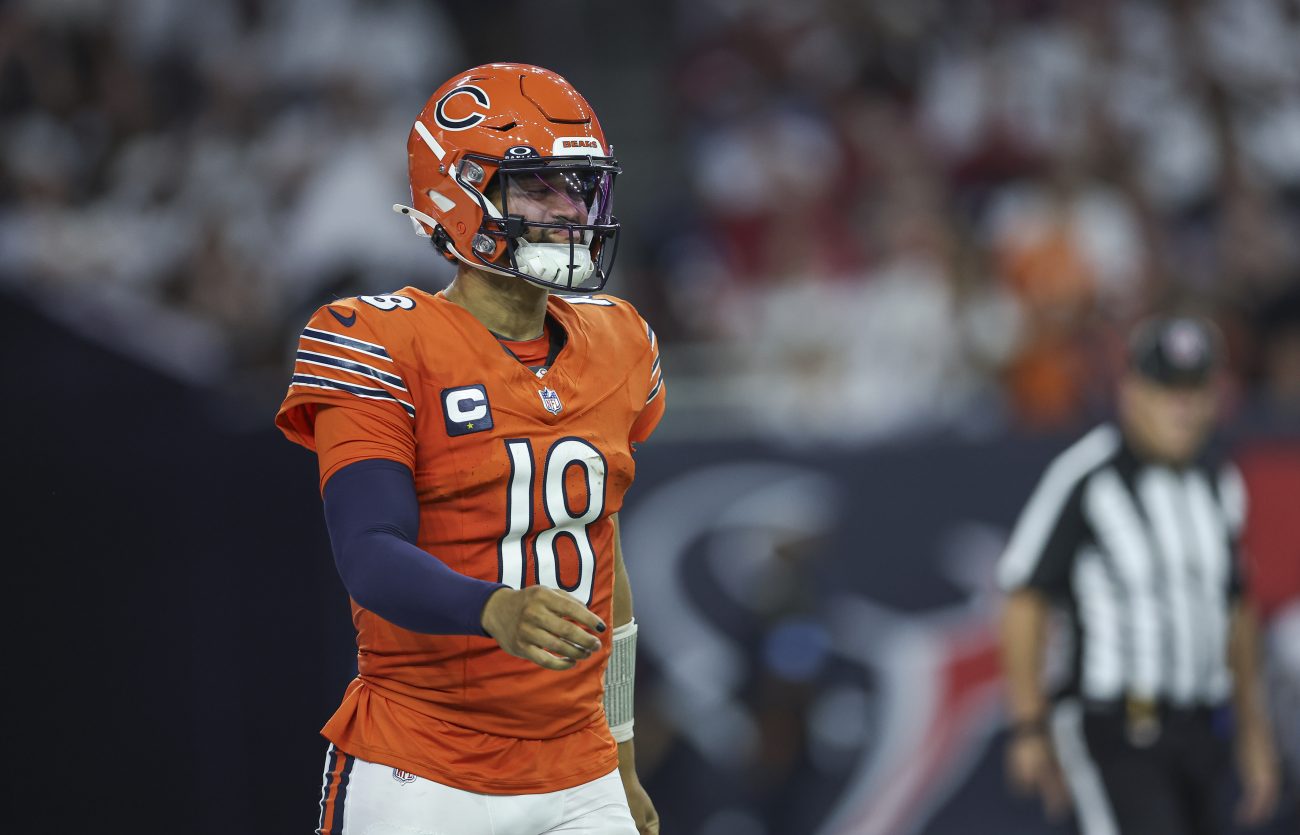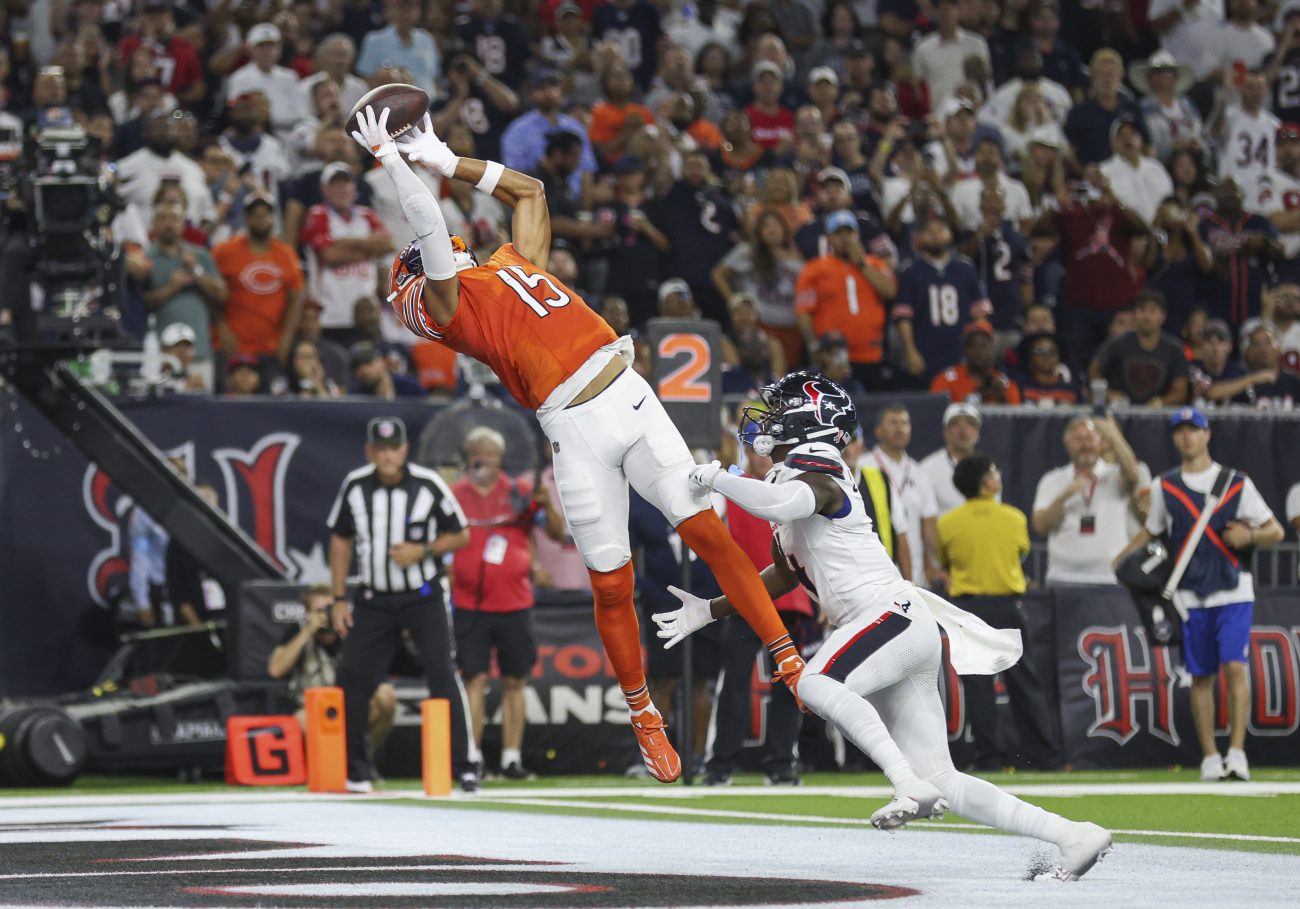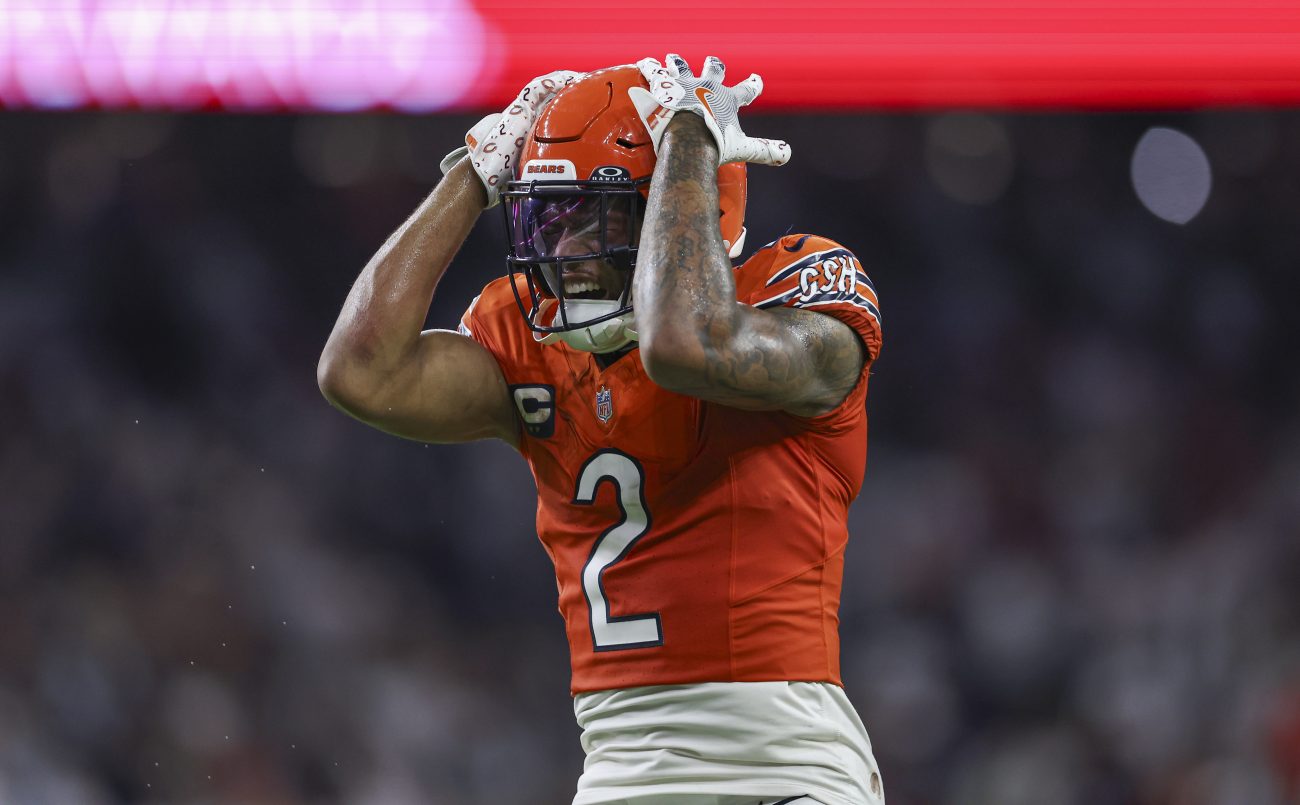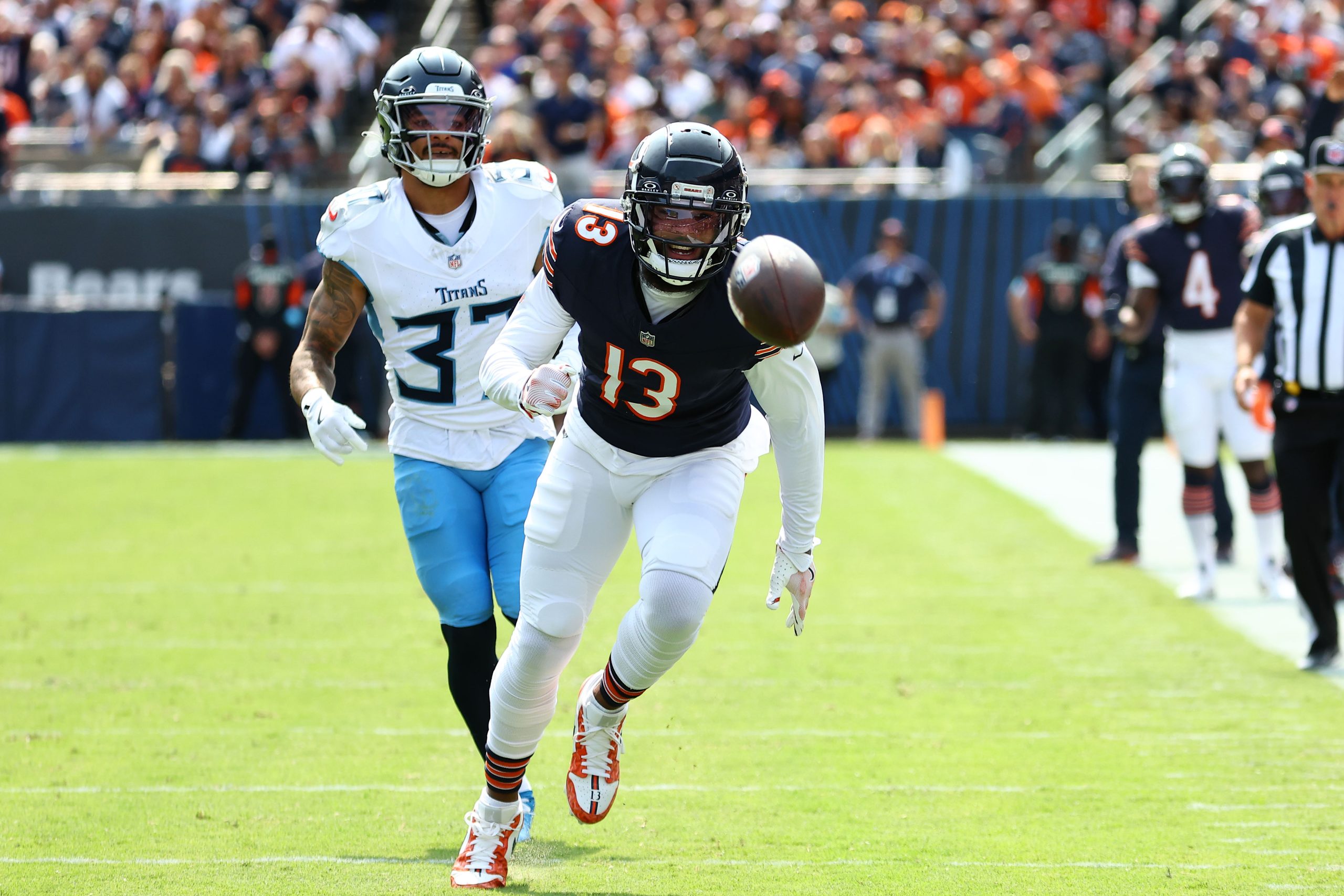The Chicago Bears lost their first game of the season on Sunday night, falling to the Houston Texans by the final score of 19-13. Despite continued struggles on offense, including offensive line failing to protect quarterback Caleb Williams and a continued issue establishing the running game, Chicago still had a chance to steal a victory against Houston the team’s final offensive possession of the contest. Through the first two games of the season, the Bears’ offense has scored just one touchdown, as there are legitimate concerns regarding offensive coordinator Shane Waldron’s offensive scheme and personnel decisions.
Shane Waldron’s offense lacks any fluidity when it comes to play-calling and personnel utilization
On Sunday, Shane Waldron’s offense had Caleb Williams throw for 174 yards while being sacked seven times, while starting running back D’Andre Swift rushed for 18 yards on 14 attempts. Chicago’s passing game seemed to have no creativity as their rookie quarterback attempted more passes for ten yards or less than throws 20 yards or more. Additionally, how Waldron has deployed and utilized the offense’s wide receiver and tight end personnel has been a concern too.
Running the ball has been an extremely difficult task for Chicago’s offense through the first two games, as Shane Waldron’s unit has only totaled 155 yards. Swift has received a majority of the attempts, including inside handoffs, despite the roster featuring more proven power halfbacks in Khalil Herbert and Roschon Johnson. Herbert has only four attempts while Johnson has yet to garner a handoff through the first two games, which is extremely puzzling with the offensive line struggles, resulting in Swift being stopped for losses on rushing attempts on the inside and outside.
Beginning with play-calling, it appears that Waldron is trying to run his scheme from Seattle, as if he has the same personnel here in Chicago and is not accounting for the potential lack of experience and unfamiliarity with the play-calling that the players may not have. For example, the Bears’ offensive coordinator has used tight ends Cole Kmet and Gerald Everett on short-yardage routes, including numerous screens, despite both players have experience being mid to deep level threats. Additionally, Shane Waldron has repeatedly given Swift rushing attempts in between the tackles, when the running back is known more for his quickness than his strength, leading to him being bottled up more easily.

One of the other glaring issues with how Waldron is using his offensive personnel is the odd over reliance on wide receiver Deandre Carter, who was considered to be the fifth option at the position at the beginning of the season. Carter has been targeted significantly more than other pass-catchers on deep passing-plays, including rookie Rome Odunze and Tyler Scott. Based on what was seen from Shane Waldron’s offense during the preseason, fans and the media were led to believe that Odunze and Scott were going to be the consistent deep threats on offense for Williams, and not Carter, who is a journeyman punt returner.
From a play-calling standpoint, Chicago’s offense appears to not have a fluid play-calling for passing plays as each offensive drive feels vastly different from one another. Against the Texans on Sunday, Williams started the game off hot as he completed several key throws on the team’s first drive which featured multiple slants and out patterns, something that exposed the Texans’ defense. However, as the game progressed, Shane Waldron began calling more screens and short-yardage lateral throws, something that led to Chicago’s offense only have three total plays of six yards or more in the third quarter.
The type of passing plays being called for Williams has been troubling too given the amount of success the rookie had in the preseason compared to what has been seen through the team’s first two games. There appeared to be significant fluidity with Shane Waldron’s passing offense for Chicago’s rookie quarterback in the time he played against the Bills and Bengals. A key for Williams as rookie is to give him passing-plays that highlight his elite arm-strength with quick and potential deep throws, yet Waldron hasn’t dialed up many deep shots for the Bears’ signal-caller.
Shane Waldron has shown signs of not tailoring his offensive scheme to the benefit of his offensive personnel
An issue for Waldron may be his desire to want to run his scheme from Seattle regardless of the lack of experience and the chance that some of his personnel may not be best suited for the philosophy. A key piece of evidence has been the usage of running back Travis Homer, who previously played with the Seahawks when Shane Waldron was the offensive coordinator there. Homer has receiver more snaps and nearly rushing attempts than Herbert, despite Herbert being used significantly more last season.
Although wide receiver Keenan Allen has been injured and missed Sunday’s contest against the Texans, the usage of Carter, especially over Scott is extremely troubling. The second-year wide receiver was expected to have a breakout season as he was expected to take advantage of defensive pass-coverage being devoted to Odunze, Allen, and DJ Moore, but he has yet to record a catch, let alone a target. During his time with the Seahawks, Waldron has made it a focus to consistently target three wide receivers repeatedly, yet Carter shouldn’t be featured more than Scott, who was slated to be the offense’s fourth receiver at the beginning of the season.

Given the immense struggles by Chicago’s offensive line, Waldron may be forced to alter his offensive game-plan going forward to counteract the blocking issues. Although he may want to run his scheme like how he did in Seattle, it is in his best interest to reset with a simplified passing and rushing gameplan against the Bears’ next opponent in the Indianapolis Colts. There is an opportunity for Shane Waldron to lean on an inside running attack with Herbert or Johnson to help set up deep play-action passing-plays for Williams, which could help provide a clean pocket and open targets downfield for the rookie quarterback.
Through two games, Chicago’s offense has only one touchdown and less than 400 yards of total offense, which could be attributed to Shane Waldron trying to do too much early on as a play-caller. Especially with a rookie quarterback in Williams, the Bears’ offensive coordinator may want to try to dial back his offense scheme to its simplest form and utilize plays that highlight his players’ best strengths. With the Colts’ defense struggling to stop opposing offenses and having several significant injuries, Waldron has the chance to reset the offense starting this upcoming Sunday.
For More Great Chicago Sports Content
Get the latest Chicago sports news, analysis, and breaking stories on the Bears, Bulls, Blackhawks, Cubs, White Sox, Sky, and more! Tap the star to add us to your favorites on Google News, so you never miss a story on your favorite Chicago teams.
Follow us on Twitter at @chicitysports23 for more great content. We appreciate you taking time to read our articles. To interact more with our community and keep up to date on the latest in Chicago sports news, JOIN OUR FREE FACEBOOK GROUP by CLICKING HERE




